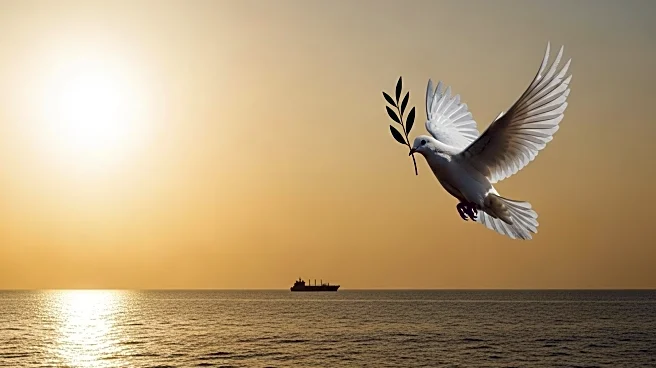What is the story about?
What's Happening?
Turkey is set to send a special plane to Israel to repatriate 140 of its citizens, along with Malaysians and Indonesians, who participated in the Gaza flotilla intercepted by Israeli naval commandos. The operation is coordinated with Israeli authorities, and the Allenby Bridge crossing on the Jordanian border will be opened to transfer dozens of Arab nationals, including citizens of Tunisia and Algeria, who joined the flotilla. Additionally, Israeli officials are preparing to charter a separate plane to fly hundreds of European activists back to Europe. The flotilla, consisting of approximately 500 activists on 50 ships, claimed to carry humanitarian aid for Gaza, but Israeli authorities found no aid on board. The activists documented their journey and the Israeli navy's takeover through live broadcasts and social media posts.
Why It's Important?
The evacuation of flotilla activists highlights ongoing tensions and diplomatic challenges surrounding the Gaza conflict. The flotilla's interception by Israel underscores the complexities of international activism and humanitarian efforts in conflict zones. The involvement of multiple countries in repatriating their citizens reflects the global dimension of the issue, potentially influencing international relations and diplomatic strategies. The situation also raises questions about the effectiveness and transparency of humanitarian missions, as the absence of aid on the flotilla ships contradicts the activists' claims. This development may impact future international efforts to address humanitarian needs in Gaza and influence public perception of such initiatives.
What's Next?
The next steps involve the logistical coordination of repatriating the activists, with Turkey and other countries working closely with Israeli authorities. The potential launch of another flotilla with 11 ships carrying doctors and journalists bound for Gaza could further escalate tensions and draw international attention. The deportation process for activists who refuse to sign deportation orders will continue, with judicial proceedings expected for those held at the Ketziot facility. Diplomatic efforts to persuade activists to accept voluntary deportation are ongoing, and the situation may lead to further diplomatic negotiations and discussions on humanitarian access to Gaza.
Beyond the Headlines
The interception and subsequent evacuation of flotilla activists may have broader implications for international law and maritime security. The legal proceedings against activists who refuse deportation orders could set precedents for handling similar situations in the future. Additionally, the event highlights the role of social media in amplifying protests and documenting conflicts, potentially influencing public opinion and policy decisions. The involvement of multiple countries in the evacuation process underscores the interconnected nature of global diplomacy and the challenges of addressing humanitarian issues in politically sensitive regions.














